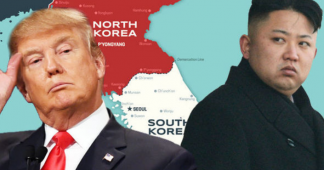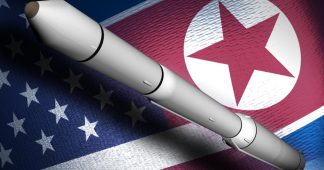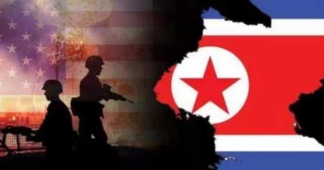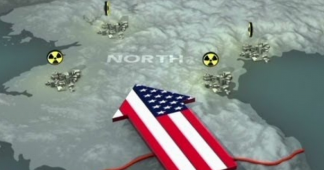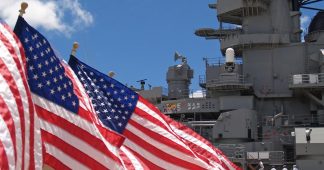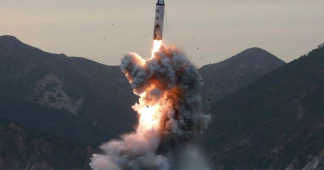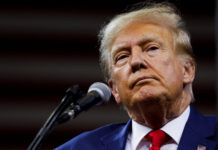The unending series of inflammatory and reckless threats by Donald Trump and his top advisers against North Korea have provoked global fears that the world is being brought to the brink of a nuclear war and a catastrophic loss of human life.
The US president’s vow to unleash “fire and fury the like the world has never seen” has been followed by his National Security Adviser Gen. H.R. McMaster warning that Washington is prepared to wage a “preventive war”—a doctrine outlawed by the Nuremberg Nazi war crime trials—to stop North Korea “from threatening the United States with a nuclear weapon.” Trump’s defense secretary, Gen. James “Mad Dog” Mattis, declared Sunday that the Pentagon has “many options” to carry out “the total annihilation of a country, namely North Korea,” and that Trump was being “briefed on each one of them.”
Most recently, US Ambassador to the United Nations Nikki Haley declared Monday on the Security Council that North Korean leader Kim Jong Un “is begging for war.” This has been combined with Trump’s chiding the South Korean government for attempting “appeasement” of Pyongyang, and repeated declarations that the time for talks has ended.
With each ratcheting up of these threats to unleash a nuclear conflagration, the question is posed with increasing force: Will Washington go to war to make good on its war rhetoric? Have the threats themselves—and the determination to prove they are not mere bluffs—become a driving force in the march to a potential nuclear war?
It is an article of faith within the Trump administration, the US military high command and powerful sections of the state apparatus and the American ruling oligarchy that under the Obama administration, US imperialism suffered a “loss of credibility” on the global arena, encapsulated in Obama’s failure to make good on his “red line” for a US war against Syria. To reverse this “loss,” Washington may well choose a patently insane military option on the Korean peninsula.
That this is perceived as a real and present danger within US ruling circles found unmistakable expression in a slump in share prices when Wall Street resumed trading Tuesday and a climb in the price of gold to its highest level in nearly a year.
The war threat is not merely a function of the bellicose tweets from the fascistic billionaire demagogue in the White House. There is no organized public opposition to the drive to war. What leading figure within the Democratic Party has spoken out against it? When have any public hearings been convened to consider the consequences of an all-out war on the Korean Peninsula?
The corporate media, a pliant instrument of war propaganda, treats the conflict as if it has no broader historical or geopolitical context and is unrelated to anything that took place before the latest North Korean missile launch or bomb test.
One would hardly guess that there are people alive today in North Korea who can remember the US war 65 years ago in which some 3 million Koreans lost their lives, the great majority of them in the north, and in which every one of the country’s cities was reduced to smoldering rubble by US bombs and shells. For them, the invocation of “fire and fury” is no mere rhetorical excess. Ever since, the US has maintained a massive military presence on North Korea’s borders, while regularly threatening it with nuclear-armed bombers, submarines and warships.
As in every US war of aggression over the past quarter-century, the present buildup to military confrontation with North Korea is being prepared with the charge that North Korean leader Kim Jong-un is “crazy”—like Noriega, Milosevic, Saddam Hussein and Gaddafi before him. In previous wars–in Iraq, Afghanistan, Libya and elsewhere–a pretext was invented, either of some horrific threat posed to the US by “weapons of mass destruction” or terrorism, or of an imminent “human rights” disaster that could be countered only by US firepower. The nuclear issue in North Korea is no different.
Why North Korea’s possession of nuclear weapons constitutes a mortal threat to the US, while other countries, including Israel, Pakistan and India, have been allowed to obtain such arms, in some cases with US assistance, is never explained. The threat of a nuclear clash between India and Pakistan, both ostensible US allies, is arguably greater than any threat on the Korean Peninsula.
The escalating war crisis bears the stamp “Made in the USA.” The previous wars of aggression waged by Washington have a direct bearing on the behavior of the North Korean leadership. There is nothing “crazy” about its determination to maintain and develop its nuclear capability after seeing the fate of both Iraq’s Hussein and Libya’s Gaddafi, who gave up their weapons programs to appease Washington and, in return, saw their countries invaded and destroyed before they themselves were murdered. While not “crazy,” the North Korean leadership miscalculates the insanity of US imperialism, which is prepared to dispense with previous restrictions against nuclear war to advance its aims.
These aims are directed not against the policies pursued by the government of the impoverished and isolated country of North Korea, but rather at the two countries bordering it, China and Russia, both nuclear-armed powers that Washington regards as chief obstacles to its drive to exert its hegemony over the Eurasian landmass and the entire planet. Even as it threatens war against North Korea, Washington is mounting “freedom of navigation” provocations against China in the South China Sea and conducting a provocative military buildup in the Baltics against Russia.
A new war on the Korean Peninsula has every prospect of drawing in China, as did the war of 65 years ago, and Russia, posing the threat of a nuclear Third World War.
Even the “best case scenario” of a conventional war against North Korea would involve the deaths of tens if not hundreds of thousands of people, while a nuclear exchange poses the slaughter of tens if not hundreds of millions and the potential extermination of life on the planet.
Far from restoring US imperialist “credibility,” a so-called “preventive war” against North Korea would turn the US into a pariah state the world over, reviled for crimes without precedent since those of Hitler’s Germany. US political leaders implicated in these crimes would be unable to leave the US for fear of facing arrest warrants abroad.
The political, economic and, indeed, moral fallout from such a war would unleash an internal crisis of unprecedented dimensions, calling into question the very existence of the United States.
The present war danger is, in the final analysis, the outcome of the failure of the entire political system in the US. The diseased state of American political culture may find its personification in the loathsome figure of Donald Trump, but it is deeply rooted in the crisis of US and global capitalism and pervades both political parties, the media and every institution of the capitalist state and ruling elite.
For the quarter of a century that has followed the dissolution of the Soviet Union, US imperialism has sought to counter its global decline by means of unending—and unsuccessful—wars of aggression that have killed, maimed and displaced millions.
War abroad has gone hand in hand with ever-widening social inequality and relentless attacks on the living standards and basic rights of the working class at home. The reckless and criminal foreign policy that is leading to a catastrophic war in Asia is mirrored in the inability and unwillingness of the American ruling class to respond to, much less prepare for, catastrophes like Hurricane Harvey, as vast social wealth is funneled into the enrichment of a narrow layer of financial oligarchs.
The same crisis of capitalism that creates the drive to nuclear war is laying the objective foundations for revolutionary struggles of the working class. However, the gap between the advanced state of the drive toward world war and the consciousness of this threat among broad layers of workers must be overcome. Only a politically conscious and independent intervention by the working class fighting for socialism in the United States and internationally can prevent a global catastrophe.
Bill Van Auken
